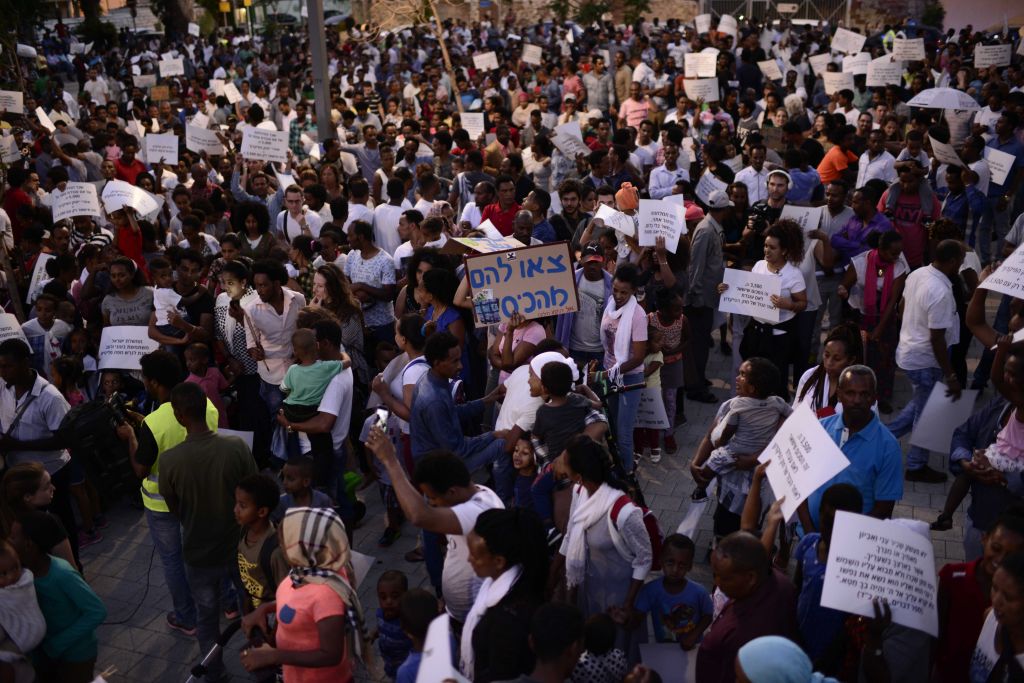As Israel steps up efforts at deportation, prime minister asserts majority of the mostly Eritrean and Sudanese nationals came here to ‘look for jobs’

Prime Minister Benjamin Netanyahu on Sunday said the tens of thousands of Africans who are living in Israel illegally are not legitimate refugees or asylum seekers, but instead are economic migrants.
“They aren’t refugees,” Netanyahu told his ministers at the start of the weekly cabinet meeting. “Or at least most of them aren’t.”
“Most of them are looking for jobs,” he asserted.
Netanyahu, who last week announced the establishment of a ministerial committee to deal with the influx of largely Sudanese and Eritrean migrants to Israel in recent years, vowed to “remove [the] illegal aliens who don’t belong here.”
The prime minister’s remarks come on the heels of a Supreme Court ruling that said the government could continue its controversial practice of deporting undocumented migrants to an unnamed third country, but also said it could no longer jail those who refuse to leave for more than 60 days.

According to the African Refugee Development Center, there are approximately 46,437 Africans in Israel who consider themselves asylum seekers. The majority, 73 percent, are from Eritrea, and approximately 19% are from Sudan. The refugees say they fled persecution and even genocide in their home countries.
The ruling — effectively hobbling the deportation program — was met with outrage by many lawmakers and residents of south Tel Aviv, an area that has seen a large influx of illegal African migrants in recent years.
Yariv Levin of the ruling Likud party called the judges’ considerations “post-Zionist,” while Justice Minister Ayelet Shaked (Jewish Home) slammed the court for degrading Israel’s Jewish character and vowed to draft legislation that would bypass the decision.

Many local residents have protested the asylum-seekers, who they claim engage in crime and have overrun their neighborhood. On Saturday, hundreds of residents protested outside the home of Supreme Court President Miriam Naor, demanding “human rights for citizens too.”
During a solidarity visit to Tel Aviv last Thursday, Netanyahu, Public Security Minister Gilad Erdan and Culture Minister Miri Regev toured south Tel Aviv and vowed that the government would “give back” the neighborhood to its Israeli residents.
Netanyahu has previously said the government would take a three-pronged approach to the issue: a security fence along the Egyptian border, which has already succeeded in significantly reducing the number of migrants who cross into Israel from African countries; increased enforcement against those employ illegal migrants and migrants who break the law; and the ministerial committee, which the prime minister said he will lead himself.
Expulsion to a third country is largely unprecedented in the Western world. Italy and Australia signed similar agreements with third-party countries — Italy with Libya, and Australia with Malaysia — but both proposals were shot down by local courts. In both cases, courts ruled the bills inconsistent with international law and the 1951 UN convention on refugees — to which Israel is also a party.
However, the Supreme Court also ruled that since the deportations may only be carried out with the agreement of the migrants, refusal to leave Israel cannot be considered uncooperative behavior, and Israel may not imprison migrants who refuse to leave for more than 60 days.
As reported by The Times of Israel
